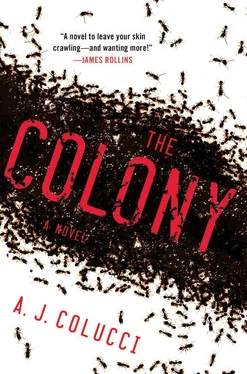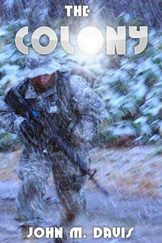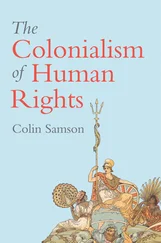Kendra tried to reel in her paranoia, attempting to focus on something positive, like her work, but even that made her fidgety and restless.
“How much gas does this thing hold?” she grumbled. “Maybe we should stop for a fill-up.”
Cameron’s eyes didn’t wander from the screen.
“Hey,” she shouted. “They teach you how to ignore people at the Bureau? Some kind of course—FBI’m a Dickhead 101?”
“Pretty trashy mouth for a dainty desert flower,” he said.
Kendra was encouraged that at least he’d finally spoken. “I’m more of a cactus,” she replied sharply.
The agent chuckled.
“What’s your problem? You have something against entomologists?”
Cameron shrugged. “It’s hard to believe there are that many adults looking at bugs all day. How can you possibly make a living?”
“Amazingly, the world of insects is quite profitable. Pesticides, royal jelly, silks, soaps.”
“That’s right. You owned some big company. What’s it called? Invicta.” He furrowed his brow, thinking. “That’s a species of ant. Latin for ‘invincible.’”
“You’re smarter than you look,” she muttered.
“So what’s your racket?”
“Pheromone manipulation.”
“Oh yeah. Insect birth control—what will they think of next?”
Kendra rolled her eyes, fairly used to snide comments. The work she was conducting in the desert stemmed from a relatively newer branch of entomology. Integrated pest management, or IPM, involved more sophisticated, biologically based methods of controlling insect populations in agriculture. Often this included the manipulation of insect pheromones. By saturating crops with a synthetic version of a female insect’s mating odor, scientists could jam the mating communication system of males so they could never locate a female. They would eventually die, single and confused.
Despite studies showing that pheromone manipulation was ecofriendly, highly effective and could potentially yield up to a 1,000 percent return on its investment in one year, it remained grossly underutilized, a tiny fraction of pest management. Not only was the process of isolating, identifying and synthesizing pheromones extremely difficult and expensive, the biggest problem by far was the world’s pesticide-dependent mentality. The six agrochemical giants were multibillion-dollar gods of the farming industry that were only too happy to unveil the next generation of toxic chemicals, as insects became resistant to the old ones. Poison was the solution of choice, despite the fact that only 2 percent of pesticides usually hit the intended targets, and 98 percent ended up in the air, soil and drinking water, while killing off beneficial, indigenous insects. IPM was meant to break the cycle of chemical dependence and Kendra was slowly making a name for herself in the small circle of IPM researchers.
“You people like to complain about bug spray,” Cameron said, “but God forbid there’s a worm in your apple.” He laughed at himself.
Kendra turned up her lip. “There are some creatures in the world more annoying than insects.”
Cameron nodded, seeming to have missed the joke, and then asked, “You mean like members of COP?”
Kendra knew he was referring to Citizens Overseeing Pesticides, a somewhat radical group of entomology students at Harvard. Kendra had been a member in graduate school and written a number of journal articles for the organization. COP had become notorious by uncovering secret memos and documents inside the EPA and various chemical companies, finding links between pesticides and such phenomena as colony collapse in honeybees, the rise of ADHD in children, and elevated hormones in girls. They made national headlines with claims that the average American is exposed to more than ten different pesticide residues on their food each day, and the fact that more than 50 percent of the insecticides used in poor countries was neither monitored nor approved.
“Bunch of communists,” the agent said under his breath.
Kendra’s ears popped as the plane seemed to drop, and she threw her attention toward the window. They had reached the coast. New York Harbor was shimmering gold in the late afternoon sun. The Statue of Liberty looked smaller than she remembered, with a melancholy face.
Kendra blew out a disgruntled breath. “So what’s in New York?”
“Christ, where’ve you been for two weeks?”
“Why don’t you check your folder?”
“All right,” Cameron said with a leer that rattled her. He settled back comfortably in the seat and leafed through the folder. “Parents were both entomologists. That explains a lot… died when you were seven years old… murdered in South America.” He looked at Kendra straight-faced. “How very sad.”
Kendra stiffened.
“Well, well. The cactus has a brain. Six years at Harvard… married your professor… Dr. Paul O’Keefe.” He flipped the last page. “Then the promising star of the bug world disappeared into the desert.”
For a moment, all she could manage was a cold stare, but then the muscles of her jaw relaxed into a grin. “You’re funny, you know? Clean-cut. Slick suit. Probably specialize in waterboarding, right?” Kendra didn’t flinch when the agent scowled. “Know what? I didn’t break any laws. I’m not your prisoner. The second we land—I’m gone.”
Cameron turned away with a slow nod and appeared calm. Kendra felt victorious but then he stood up tall, casually brushing away crumbs from his suit, and sidestepped across the aisle. A chill hit Kendra in the marrow of her bones when he fell into the seat next to her, smelling of fresh linen and testosterone and fixing his pale blue eyes upon her. He lifted an arm over her chair and pulled back his jacket to reveal a gun holstered to his chest. For some reason Kendra found it alarming that this particular federal agent was carrying a weapon.
In his most sarcastic tone he said, “You know, Professor, that’s really brave of you, standing up to the government like that. I really admire that kind of spunk. ”
She turned toward the window.
“Just one thing,” he whispered. “Now look at me, dear.” His thumb reached out and drew her face back toward him. Kendra was jolted by his touch. “This is a very serious matter of national security,” he explained softly. “You could call it a matter of life and death.”
Kendra tried to be cool, forced a sarcastic chuckle.
“Yes, I know it sounds cliché,” he continued. “But I want to make sure you understand the gravity of the situation and possible consequences of your actions. I am authorized to use force to get you to New York.” His fingers casually rubbed the edge of his lapel so that his jacket opened wider and the gun was completely exposed. “Do you understand what I’m saying? Nod your head so I know that you do.”
Kendra stayed perfectly still, except for a slight tremble of her bottom lip.
Cameron searched her face and found what he expected. “Good. Now we understand each other.”
Kendra didn’t move until Cameron returned to his seat, and then she shut her eyes and exhaled.
The agent closed his laptop and straightened his tie. “Better fasten your seat belt.”
The Cessna seemed to take a dive and Kendra grabbed the armrests to steady herself. They were descending somewhere over Long Island. The plane eased down on the runway at LaGuardia, then taxied to a restricted area for government aircraft. The pilot parked next to a row of matching Cessnas and when the engine fell silent, he released the door and it unfolded into a staircase.
Agent Cameron put away his folders and laptop and motioned Kendra toward the exit. She stopped at the doorway, staring up at the blue sky over Queens and a hazy, far-off view of the Manhattan skyline. She breathed in air that wasn’t anything like that of the desert and wiped her watery eyes.
Читать дальше












